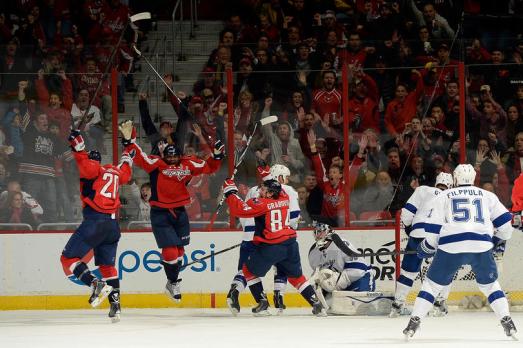[Today we inaugurate another series, another offspring whom we hopefully won’t leave starving in the streets to eventually attempt to rise up against the bourgeoisie: A Moving Picture, exploring the use of classical music in films great and bad, sweeping and small. Not to be confused with its enchanting sibling, Score-ally Yours. That one examines film scores, with more of an overall view of that element of a movie (and, I believe, scores written specifically for films). A Moving Picture will tend to look at moments where already-written classical music was used to great effect in a movie. Of course, we could have called it something else. Something dorky and fantastic. Velvet Seats & Velveteen Breeches. Celluloid in C Major. Fluffing the Sheet Music. Dorky and Fantastic.]
The impetus for the first post of A Moving Picture came in the form of something pretty well divorced from the world of classical music: professional ice hockey (thanks for the inspiration, Emily Wright!). What’s the link, you ask? Glad to share! Thanks for being so interested. Last night, the hometown team, the good guys, the boys in the red sweaters, the hockey players of our nation’s capital and (let’s admit it) our hearts, the Washington Capitals, won a pretty stunning home game against the Tampa Bay Lightning. (For the initiates, yes, they play hockey in Florida. No, I still don’t know why.) Finding themselves down 3-1 after the first period, the Caps stormed back to finish the 2nd period knotted up at 4-4. Team captain Alex Ovechkin scored the team’s lone goal in the 1st and added two more in the 2nd, giving him a hat trick. A pretty rare occurrence that is greeted with joy and gladness, particularly when it’s done by the guy who is the heart of the team in a few senses. So we go to the 3rd period. The bad guys score again to go up 5-4. With less than a minute to go, the Caps finally ‘capitalized’ to tie it up yet again, with the goal scored by – you guessed it – Ovechkin. Four goals in one night. It’s pretty freaking rare, much less in a very close game. We needed the captain to dig us out of a hole and help us get the win last night, and he delivered. He’s our boy and he’s unique. Even with everything we’ve ever watched him do on the ice that caused our heads to shake slowly from side to side, last night was special. The Caps went on to win – in a shootout, but still. I won’t forget that game for a long time indeed. What a joy.
“Freudig, wie ein Held zum Siegen!”
Forgive the long detour. Hopefully you classical music fans made some mental jokes about Canadians taking slapshots in the teeth and eating donuts while driving a Zamboni hopped up on Labatt. If you didn’t, please take a moment to do so now.
That game last night, with all its attendant drama and triumph, reminded me instantly of a wonderful scene involving classical music in “Dead Poets Society.” If I was the type of person to make lists of favorite movies, that one would assuredly figure prominently. The story, the acting, the cinematography, the details of the locations and props…it is a very moving work of art, if I may be so grandiose.
And classical music makes several poignant cameos throughout the movie. Robin Williams’s character, John Keating, dangerous brigand and anarchist, is of course given to whistle Tchaikovsky’s “1812 Overture” at whiles (it starts slow, give it a minute). This is a piece most people are familiar with, from the hands of a composer possessed of what Schonberg calls “a sweet, inexhaustible, supersensuous fund of melody.” Eminently whistleable. Fun fact: the overture has nothing to do with the War of 1812. Tchaikovsky had a rather turbulent personal life, owing to his closeted homosexuality amid the stiff mores of 19th-century Imperial Russia. He did marry, but it caused a complete breakdown that involved a suicide attempt, eventual cuckolding, and perhaps inevitably, the wife being placed in an insane asylum where she died after twenty-one years. Fun stuff. The 1812 Overture (in E-flat major, op. 49) tends to be dismissed in commentary on Tchaikovsky’s body of work – I suppose due to its popular appeal, appearance at fireworks shows, and frequent accompaniment by cannon. God knows, we wouldn’t want a thing like popularity to sully the art form!
But the scene I called to mind was one with no spoken words. While Beethoven’s immeasurable “Ode to Joy” plays (lyrics from a poem by Schiller), Keating plays a riotous game of soccer with his students as the late autumn sunlight gradually fails, setting the woods aglow. When they score a goal, in their exultation they rush over and surround Keating, their leader, lifting him onto their shoulders and charging across the field as they yell in celebration, Keating’s arm raised in victory. It is a beautiful moment for which the welling emotion and glorious humanism of the “Ode to Joy” is quite meet. And a moment that fades all too quickly, as he warned his students on the first day of class.
Freude, schöner Götterfunken
Tochter aus Elysium,
Wir betreten feuertrunken,
Himmlische, dein Heiligtum!
I love these graphical visualizations of classical music. Here is one of the “Ode to Joy,” which is part of the fourth movement of Beethoven’s final symphony, the mighty Ninth (D-minor, op. 125).
It fills the soul. “To dance, clap hands, exult, shout, skip, roll on, float…on!”
Beethoven also appears later in the film when Neil Perry comes to visit Keating in his office: the second movement of the “Emperor” piano concerto (no. 5, op. 73) is playing.
Substitute Ovechkin for Keating in the Ode to Joy scene and you have a picture of how I felt last night. So, to sum this entire ramble up in one barbaric salute to Ovi, the Great 8, YAWP.

